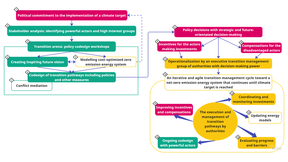Public defence in Design, M.Sc Karoliina Auvinen

When
Where
Event language(s)
A new doctoral dissertation proposes a decision-making model based on policy co-design and the modeling of a zero-emission energy system to accelerate the energy transition toward zero emissions. The model can generate an effective mix of policies that, in addition to investment incentives, include compensation measures for the negative impacts of the transition. The current decision-making system has not been able to produce sufficiently effective policy mixes to achieve the climate goals set by Finland's Climate Act or the Paris Climate Agreement within the designated timelines.
There are significant barriers on the path toward zero-emission energy systems: the long lifespan of machines, vehicles, and power plants that use fossil fuels, resistance from stakeholders dependent on or benefiting from fossil fuels, and the short-term focus of political decision-making. Overall, the transition is progressing too slowly.
While the dissertation focuses primarily on the energy transition from the perspective of district heating systems, it concludes that the goal of a zero-emission energy system, both in terms of timing and technology, must be pursued simultaneously across the heating, industry, agriculture, and transport sectors.
In the codesign and transition management model presented in the dissertation, climate goals and their timelines are non-negotiable. Decision-makers and experts codesign policies based on the modeling of a zero-emission energy system, considering the interdependencies of subsystems, actors' path dependencies, and investment constraints. Significant and sufficient investments are initiated rapidly. At the same time, disputes arising from the transition are resolved systematically. The model follows a cyclical process (see figure) until a zero-emission energy system is achieved in Finland in less than 15 years and globally in less than 30 years.
However, the implementation of this and many other climate solutions is very challenging and slow. For this reason, decision-making must be improved quickly, as without accelerating numerous actions, it will not be possible to achieve the goals of the Paris Climate Agreement. Accelerating the zero-emission energy transition requires dramatically greater efforts from decision-makers and improved decision-making processes to urgently achieve better results. This could still partially avoid the escalation of the damages and costs of climate change.
Keywords: Climate change, energy system, policy codesing
Title of thesis: Accelerating energy transition toward zero emission district heating systems through policy codesign
Doctoral student: Karoliina Auvinen
Opponent: Senior Associate Professor Dick Magnusson, University of Linköping
Custos: Professor Sampsa Hyysalo, Aalto University School of Arts, Design and Architecture, Department of Design
Thesis available for public display 10 days prior to the defence at: https://aaltodoc.aalto.fi/doc_public/eonly/riiputus/
Contact
| karoliina.auvinen@iki.fi | |
| Mobile | +358503305418 |
Doctoral theses in the School of Arts, Design and Architecture: https://aaltodoc.aalto.fi/handle/123456789/54
Zoom Quick Guide: https://www.aalto.fi/en/services/zoom-quick-guide






